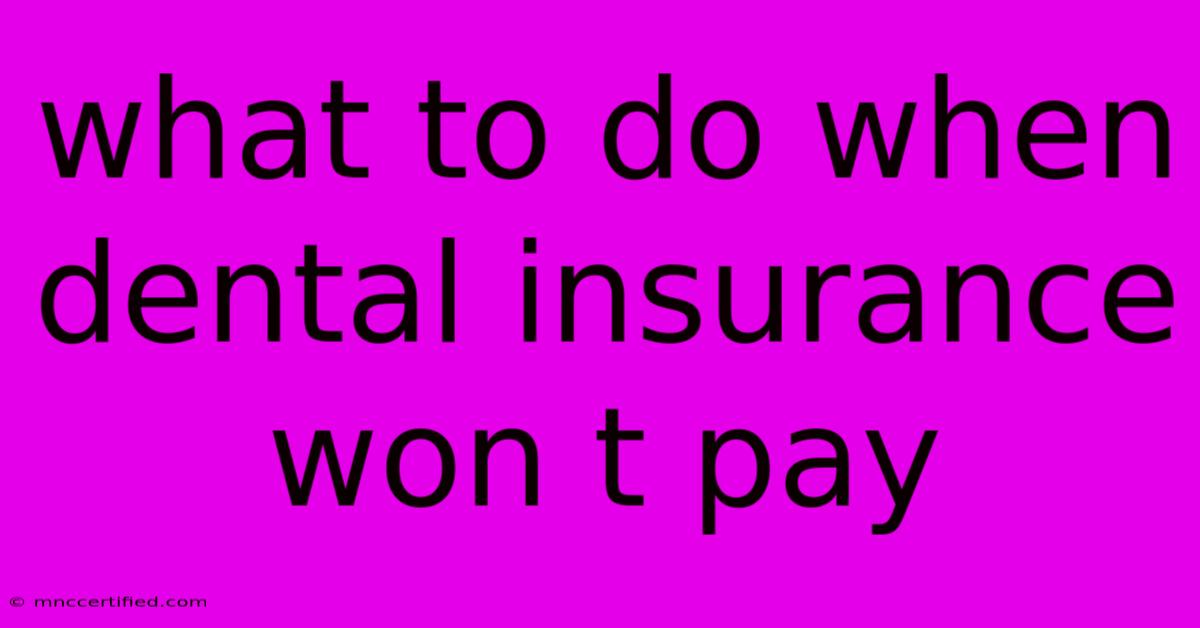What To Do When Dental Insurance Won T Pay

Table of Contents
What to Do When Dental Insurance Won't Pay: A Comprehensive Guide
Dental insurance can be a valuable asset, but sometimes it falls short, leaving you with unexpected dental bills. When your insurance company refuses to cover a procedure, it can be frustrating and confusing. This guide provides a comprehensive breakdown of what to do when your dental insurance won't pay, empowering you to navigate the process effectively and advocate for yourself.
Understanding Dental Insurance Coverage
Before diving into what to do when your insurance refuses payment, it's crucial to understand how dental insurance works and the potential reasons for denial:
1. Pre-existing Conditions: Dental insurance often has limitations on pre-existing conditions, meaning they may not cover treatments for issues that existed before your policy started.
2. Exclusions: Most dental insurance plans have a list of procedures they specifically exclude, such as cosmetic dentistry or procedures deemed experimental.
3. Waiting Periods: Some plans have waiting periods before certain procedures, like crowns or dentures, are fully covered.
4. Benefit Limits: Every plan has annual or lifetime maximums on coverage. Once you reach these limits, your insurance won't pay for additional procedures.
5. Incorrect Coding: Sometimes, the dentist may use an incorrect code for the procedure, leading to the insurance company denying the claim.
6. Prior Authorization: Many procedures require prior authorization from your insurance company before they can be performed. If this step is skipped, the insurance company may deny coverage.
What to Do When Your Claim Is Denied
If you've received a denial notice from your dental insurance company, don't panic. Here are the steps you should take:
1. Review Your Policy: Thoroughly read your insurance policy to understand the terms and conditions, especially the sections covering pre-existing conditions, exclusions, waiting periods, and benefit limits. This will help you determine if the denial was justified.
2. Contact Your Dentist: Speak with your dentist to discuss the denial. They may be able to assist in resolving the issue or provide documentation to support your claim.
3. Appeal the Denial: Most insurance companies have an appeals process. This typically involves submitting a written appeal with supporting documentation, such as medical records or a letter from your dentist explaining why the procedure is necessary.
4. Negotiate with the Insurance Company: If your appeal is unsuccessful, you may be able to negotiate with the insurance company to reduce the cost of the procedure or reach a payment agreement. Be prepared to present your case clearly and demonstrate the necessity of the treatment.
5. Seek External Help: If you're unable to resolve the issue through the insurance company's appeals process, you can consider seeking help from an independent organization, such as the National Association of Dental Plans (NADP), which assists consumers in navigating dental insurance disputes.
Alternatives When Dental Insurance Won't Pay:
1. Payment Plans: Many dentists offer payment plans to help patients manage the cost of treatment. Ask about their options and explore financing solutions like CareCredit or LendingClub.
2. Discounted Dental Programs: Organizations like the American Dental Association (ADA) provide access to discounted dental care for individuals and families.
3. Dental Schools: Dental schools often offer affordable treatment options through their student clinics.
4. Local Community Health Centers: Many local community health centers provide low-cost or free dental care for those who qualify.
5. Consider Delaying Treatment: In some cases, delaying treatment for non-emergency dental issues may be an option until you can afford it.
6. Seek a Second Opinion: If you have doubts about the treatment recommended by your dentist, consider seeking a second opinion from another provider.
Prevention and Proactive Measures:
- Understand Your Coverage: Review your dental insurance plan thoroughly before enrolling to ensure it meets your needs.
- Ask About Procedures: Before undergoing any procedure, inquire about its coverage and potential costs.
- Maintain Good Oral Hygiene: Preventative care, such as regular brushing, flossing, and dental checkups, can reduce the risk of needing expensive treatments.
- Read the Fine Print: Pay attention to any limitations, waiting periods, or exclusions in your policy.
Conclusion:
Dealing with a dental insurance denial can be stressful, but armed with knowledge and a proactive approach, you can navigate the process effectively. By understanding your coverage, following the proper appeal procedures, and exploring alternative options, you can ensure you receive the dental care you need while managing the costs. Remember, being informed and advocating for yourself are crucial steps in getting the dental care you deserve.

Thank you for visiting our website wich cover about What To Do When Dental Insurance Won T Pay. We hope the information provided has been useful to you. Feel free to contact us if you have any questions or need further assistance. See you next time and dont miss to bookmark.
Featured Posts
-
Brugge 1 0 Aston Villa Mings Concedes Penalty
Nov 07, 2024
-
Trumps Policies Elon Musks Perspective
Nov 07, 2024
-
American Summit Insurance Customer Service
Nov 07, 2024
-
Project 2025 Republicans Look Forward
Nov 07, 2024
-
Insurance Call Center Outsourcing Services
Nov 07, 2024